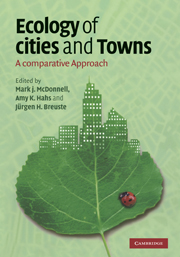Book contents
- Frontmatter
- Contents
- List of contributors
- Preface
- 1 Introduction: Scope of the book and need for developing a comparative approach to the ecological study of cities and towns
- Part I Opportunities and challenges of conducting comparative studies
- 2 Comparative urban ecology: challenges and possibilities
- 3 Frameworks for urban ecosystem studies: gradients, patch dynamics and the human ecosystem in the New York metropolitan area and Baltimore, USA
- 4 Comparative effects of urbanisation in marine and terrestrial habitats
- 5 Comparative ecology of cities and towns: past, present and future
- 6 Comparative urban ecological research in developing countries
- 7 Using models to compare the ecology of cities
- Part II Ecological studies of cities and towns
- Part III Integrating science with management and planning
- Part IV Comments and synthesis
- References
- Index
- Plate section
5 - Comparative ecology of cities and towns: past, present and future
Published online by Cambridge University Press: 04 March 2010
- Frontmatter
- Contents
- List of contributors
- Preface
- 1 Introduction: Scope of the book and need for developing a comparative approach to the ecological study of cities and towns
- Part I Opportunities and challenges of conducting comparative studies
- 2 Comparative urban ecology: challenges and possibilities
- 3 Frameworks for urban ecosystem studies: gradients, patch dynamics and the human ecosystem in the New York metropolitan area and Baltimore, USA
- 4 Comparative effects of urbanisation in marine and terrestrial habitats
- 5 Comparative ecology of cities and towns: past, present and future
- 6 Comparative urban ecological research in developing countries
- 7 Using models to compare the ecology of cities
- Part II Ecological studies of cities and towns
- Part III Integrating science with management and planning
- Part IV Comments and synthesis
- References
- Index
- Plate section
Summary
Introduction
Comparative studies can be simply described as the systematic assessment of similarities and differences between diverse entities, philosophies and styles. To conduct such studies requires similar data that can be compared and an appropriate method or scheme of comparison. For example, comparisons can range from a simple assessment of the morphological traits of different species of plants to a comparison of the political and economic systems of different cities. Such studies have provided important new understandings about the evolutionary relationships between plants as well as the factors that influence the creation and dynamics of political and economic systems around the world. Comparative studies are a valued and well tested method of developing new understandings in a diversity of subjects and are especially well suited to studies of literature, religion, linguistics, medicine, biology and sociology. In the field of sociology, the comparative approach has been vital to understanding the structure and dynamics of human societies (Bollen et al.,1993). This chapter focuses on the less studied role of comparative studies in understanding the ecology of cities and towns.
In the field of biology, comparative methods have been successfully applied in the traditional subdisciplines of evolution, behaviour and ecology (Gittleman and Luh, 1992) and indeed in new fields such as comparative phylogeography (Bermingham and Moritz, 1998). Comparative studies of plant and animal traits have provided the foundations for the well developed classification and phylogenic systems currently used to understand the taxonomic and phylogenic relationships between organisms.
- Type
- Chapter
- Information
- Ecology of Cities and TownsA Comparative Approach, pp. 71 - 89Publisher: Cambridge University PressPrint publication year: 2009
- 21
- Cited by



